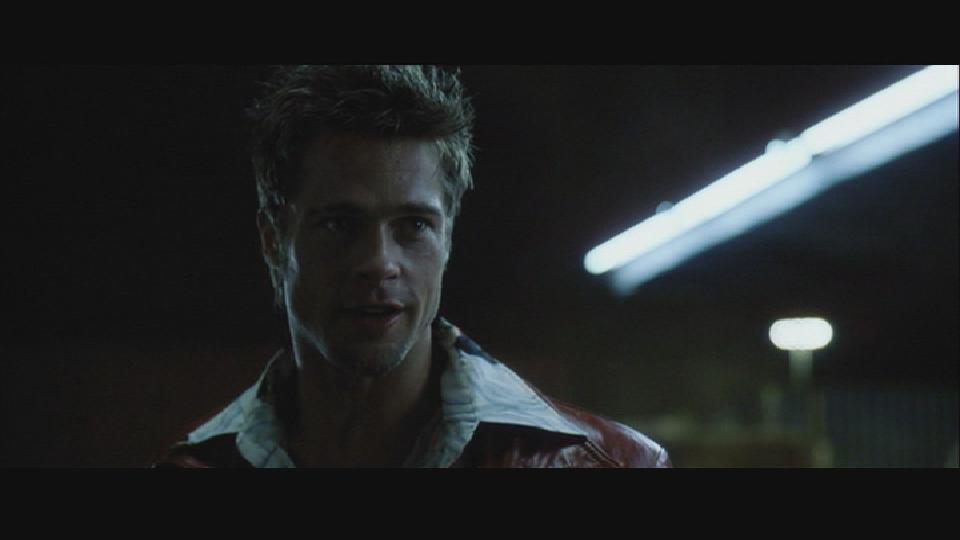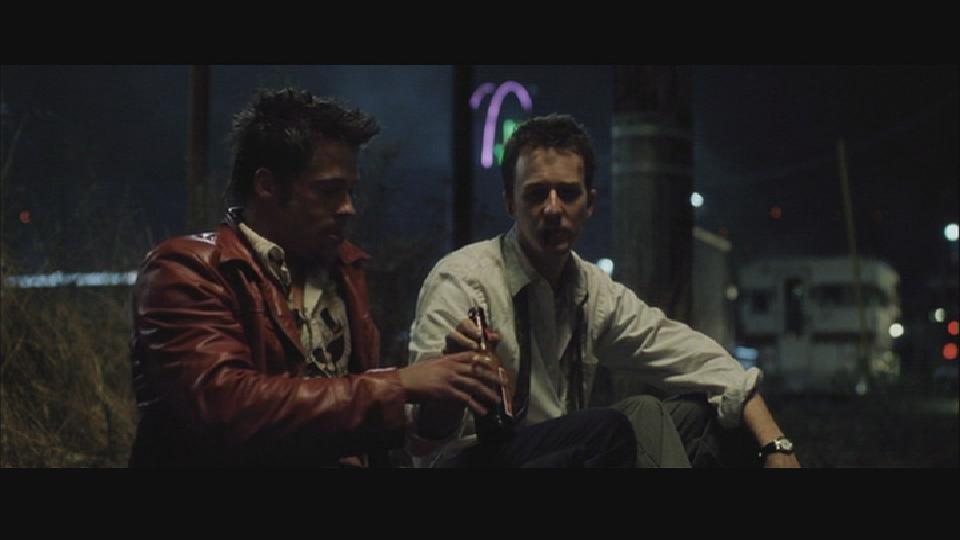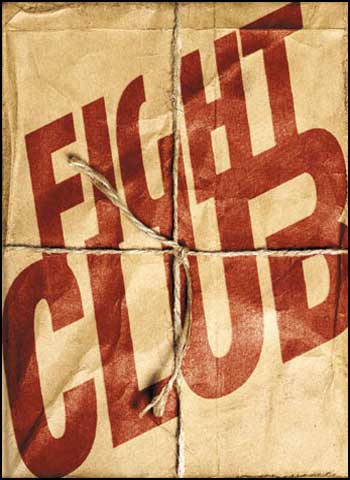
By Rob Wolejsza
with Brad Pitt, Edward Norton, Helena Bonham Carter. Directed by David Fincher. Rated R.
Perhaps no other film released in 1999 was more passionately debated than David Fincher's "Fight Club". Advocates praised its visual ingenuity and wicked satire; dissenters decried its ultraviolent nature and bleak, anti-social message. Most of those who saw it fell on one side of the fence or the other. Depending on your point of view, "Fight Club" was either an eye-popping black comedy about life in the late '90's, or it was an irresponsible piece of trash that was destined to incite the same violent acts the film seemed to denounce.
Well, the truth of the matter is that "Fight Club" came nowhere near causing young men to go out and beat the hell out of each other. Nor is it the definitive satire of our cynical modern age. "Fight Club" is actually one-half of a masterpiece; a film so good for so long that you wonder how they can keep it up. The answer is, they can't. But the first half is so strong that it makes up for when the film eventually unravels.
Based on a cult novel by Chuck Palahniuk, "Fight Club" tells the story of an unnamed Narrator (played by Edward Norton), an overworked and underpaid Everyman whose increasingly worthless life is slowly driving him insane. He hates his job, he can't sleep, and he's poured all of his money into material items that only serve to depress him even further. (A celebrated scene shows his apartment slowly filling up with the products from an Ikea catalog, complete with prices and descriptions.) In desperation, he starts going to group therapy sessions: testicular cancer one night, alcoholism the next, and so on, just so he can feel something again.
One day, on a plane home from a business trip, the Narrator meets one Tyler Durden (Brad Pitt). Tyler makes soap, lives in a dilapidated old house, and generally lives what looks like a more liberated lifestyle than the Narrator. And when the Narrator's apartment blows up, he finds himself moving in with the strange but fascinating Tyler.
It's Tyler who suggests the idea of a "fight club", and sets it up in the basement of a dive bar. At first, Tyler and the Narrator are doing the fighting. To the Narrator, it's a libertating experience, the pain of the fights giving him something tangible to experience. For Tyler, it's a way to draw people into achieving his ultimate goal: a group of men collectively known as Project Mayhem, whose job it is to perform random acts of destruction. The targets: symbols of materialism that are being shoved down the throats of the average citizen (Starbucks, Apple, Microsoft, etc.) Eventually, Tyler realizes his dream, and suddenly disappears. It's then up to the Narrator to find him, and as he criss-crosses the country, he realizes that Tyler has set his plan in motion everywhere, and is virtually unstoppable.
It's about this point that "Fight Club" self-destructs. Up until now, the film has been a hard-edged dark comedy about the evils of consumerism and dangers of self-absorption. Tyler Durden is pure id; he's the angry, violent side of our personality that we keep hidden. What "Fight Club" seems to be saying is that if we allow ourselves to be influenced by the emptiness that surrounds us, we may have no choice but to let the aggressive side of human nature come out. It's a wild concept, and it's one that "Fight Club" presents with sharp satire and pointed commentary. But as is so often the case these days with most movies, the filmmakers aren't happy to leave well enough alone. And so, what began as a smart, if over-the-top, black comedy about the ills of modern society degenerates into a manic thriller complete with a silly twist ending that's more desperate than it is ironic.
It is that first half, though, that manages to save the film from being a total washout. The acting is uniformly superb: Norton, who has yet to give a bad performance, perfectly conveys the Narrator's sense of futility. Helena Bonham Carter, as the girl who comes between Pitt and Norton, is also excellent, taking a trampy role and making it her own. And no matter your feelings for Pitt, you have to admit that he doesn't choose safe projects. Here, he turns in his best performance since his Oscar nomination for "12 Monkeys".
Of course, any film directed by David Fincher looks great, and "Fight Club" is no exception. Fox has done an incredible job in putting the film out on DVD. The widescreen presentation preserves Fincher's fantastic visuals, and the image is as crisp and clean as anyone could want. The 2-disc set also includes four (four!) audio commentaries, loads of extra features about the pre-production, making of, and post-production of the film, plus unused trailers and many TV commercials. All in all, the set is what they call "loaded".
"Fight Club" will turn many off as sick and vile, but it's also not as perfect as some might think. It may best be viewed as a fascinating experiment, a film that has a point-of-view and a statement to make, and that in itself makes it something special.

|

